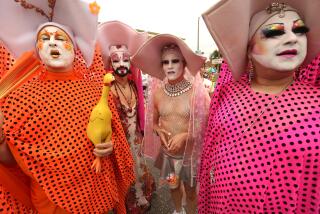Canonization of Black Nun to Be Studied
BALTIMORE — The Vatican has given the Baltimore archdiocese permission to make a case for sainthood for Elizabeth Lange, a Baltimore nun who founded the first order of black nuns.
“We want to stress that this is a very preliminary stage of the process,” said Father William Au, a spokesman for the archdiocese.
“Right now, we want to make the public aware that Mother Lange is being considered for canonization so we can receive any documentation of her life that people might have,” he said.
Mother Lange, who was Cuban-born, founded the Oblate Sisters of Providence in the Baltimore suburb of Catonsville in the 1820s.
Officials of the archdiocese will accumulate evidence of Mother Lange’s worthiness for sainthood. That evidence must include two miracles attributable to Mother Lange.
All the material will be sent to the Vatican’s Congregation for the Causes of Saints. If the congregation approves of the facts of Mother Lange’s life, the nun will be beatified, the midway point in the canonization process.
The archdiocese would then have to resubmit the previous evidence to the congregation and documentation of two more miracles. In some cases, the Pope may decide to dispense with some of the required steps of canonization.
“It can be a long, long process from where we are to canonization,” said Sister Virginie Fish, an Oblate nun. “It can take decades, it can take hundreds of years. Rome does not canonize people at the bat of an eye. I’ll be dead before Lange’s sainthood happens.”
The archdiocese’s main investigator into Mother Lange’s life will be Father John Bowen, the chaplain of the Oblates’ mother house and the archivist of St. Mary’s Seminary and University in Roland Park.
So far, the priest said, the pickings are slim.
“There’s very little written information by or about Mother Lange,” he says. “It was almost as if she made a point of making people concentrate not on her but on her works. We have exactly two letters of hers, one she wrote and one she dictated. That doesn’t mean she didn’t have other writings, we just haven’t found them yet.”
More to Read
Sign up for Essential California
The most important California stories and recommendations in your inbox every morning.
You may occasionally receive promotional content from the Los Angeles Times.










